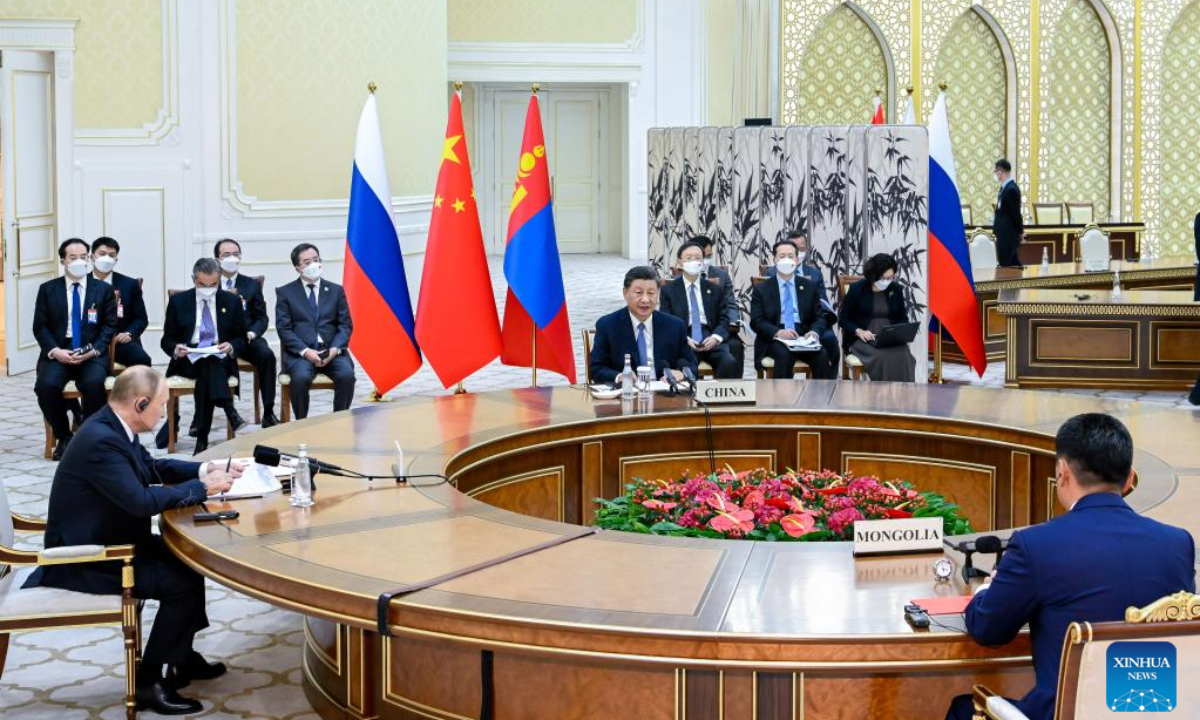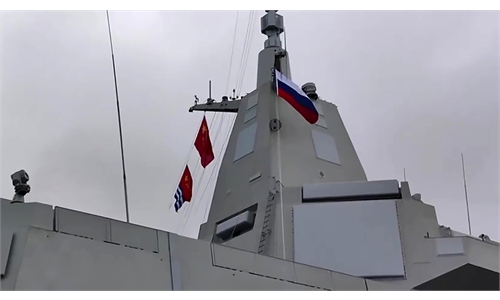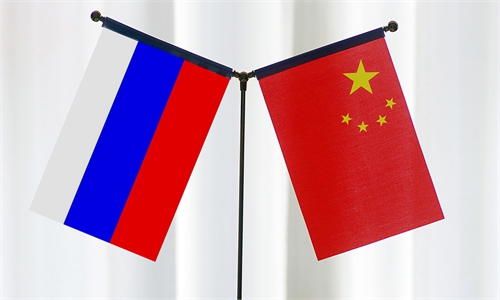China-Russia-Mongolia summit secures infrastructure and energy connectivity, enhances regional trust
Major projects closely connect neighbors with stable ties, facilitate regional devt: analysts

Chinese President Xi Jinping holds the sixth meeting of heads of state of China, Russia and Mongolia with his Russian counterpart, Vladimir Putin, and Mongolian counterpart, Ukhnaa Khurelsukh, at the Forumlar Majmuasi Complex in Samarkand, Uzbekistan, Sept. 15, 2022. (Xinhua/Zhai Jianlan)
Underscoring the strong impetus and resilience of the cooperation among China, Russia and Mongolia, Chinese President Xi Jinping held a trilateral meeting with Russian President Vladimir Putin and Mongolian President Ukhnaa Khurelsukh on the sidelines of the Shanghai Cooperation Organization summit in Samarkand of Uzbekistan on Thursday, during which the leaders agreed to move forward major projects in infrastructure and energy supply and continue to deepen trilateral economic cooperation.
This is the sixth trilateral meeting of heads of state of the three neighbors and has caught attention as it follows a surge in Mongolian economic outreach to attract new investment for economic diversification and for expanding cross-border transportation corridors with China and Russia, analysts said, pointing out that concrete trilateral cooperation especially on large-scale projects will not only facilitate economic development of the three countries but also reinforce regional stability amid the US' increasing efforts to stir up troubles in the region, analysts said.
During the meeting, President Xi said that cooperation on joint COVID-19 prevention and control in the border areas was carried out to keep economic and trade interactions steady and smooth. Notable progress was made in the development of international road transportation along the Asian Highway Network connecting the three countries.
Xi made a four-point proposal on enhancing China-Russia-Mongolia cooperation, including to keep the cooperation in the right direction to deepen political mutual trust and support, upgrade cooperation within the framework of the SCO to jointly build a platform against risks and challenges, and follow through the common understanding reached on the building of the China-Mongolia-Russia Economic Corridor to continue building high-quality platforms for exchanges of business communities.
The Chinese president also proposed working for more outcomes in trilateral cooperation and supporting the expansion of settlement in local currencies in mutual trade. Russian and Mongolian financial institutions are welcome to join the RMB Cross-border Interbank Payment System to build a strong bulwark of financial security in the region.
The trilateral meeting will guide future cooperation at a strategic level, Chen Jia, an independent research fellow on international strategy, told the Global Times on Thursday.
While Mongolia is in urgent need of stabilizing economic development and getting rid of the shadow of economic crisis, Russia needs to improve cooperation with China and Mongolia as it faces sanctions from the US and the West, and China also needs support from its neighbors amid a more complicated external environment. Close cooperation among the three countries not only meets their current needs but also fits long-term interests, said Chen.
The three countries confirmed the extension of the Outline of the Development Plan on Establishing the China-Mongolia-Russia Economic Corridor by five years, officially launched the feasibility study on the upgrading and development of the central-route railway of the China-Mongolia-Russia Economic Corridor, and agreed to actively move forward the project on the Mongolian section of the China-Russia natural gas pipeline.
The China-Mongolia-Russia Economic Corridor is an important part of the Belt and Road Initiative, and one of the most important parts is to promote railway construction given the shortage of infrastructure in Russia's far east regions and insufficient transport capacity, Song Kui, president of the Contemporary China-Russia Regional Economy Research Institute, told the Global Times.
Welcoming Russia and Mongolia to join the RMB Cross-border Interbank Payment System will also help them further expand energy export, simplify the settlement process, lower the risk brought by dollar currency rate and stabilize the support of energy, Song said.
The China-Mongolia-Russia Economic Corridor is more than just a passageway. In the future, cooperation between eastern Mongolia, Northeast China and the Russian Far East is likely to further drive the integration of Northeast Asia, Li Xin, director of the Institute for Eurasian Studies at the Shanghai University of Political Science and Law, told the Global Times.
Closer relations
During the trilateral meeting on Thursday, the three leaders also stressed the importance of mutual relations. Putin noted that as close neighbors, the three countries should give each other understanding and support, and consolidate and promote trilateral cooperation across the board.
Khurelsukh said the development of good-neighborly and friendly cooperation with China and Russia is a diplomatic priority for Mongolia.
Aside from the economic corridor, the three neighbors are working to push the construction of the Power of Siberia-2 pipeline. Construction of the Russian-Chinese natural gas pipeline transiting through Mongolia will begin in 2024. The pipeline will deliver previously Europe-bound gas from western Siberian fields to China for the first time and has a target date of being online in 2030, Financial Times reported in July citing Mongolian officials.
Foreign media outlets have paid close attention to the construction of the gas pipeline and some said it has become critical to Russia as the country faces the prospect of losing Europe as a market for its gas after the conflict with Ukraine.
The Power of Siberia-2 pipeline is a project that is bound to further strengthen geographical unity, enhance energy security and promote people's livelihood and economic well-being among the three countries, Chen said.
"The project shows that Mongolia is seeking closer strategic cooperation with its two neighbors in order to pursue sustainable development both politically and economically," Chen noted.
Li pointed out that the gas pipeline project is expected to increase Mongolia's revenues through gas transit and promote the development of Mongolia's petrochemical industry. This will change Mongolia's economic structure, which mainly relied on agriculture and animal husbandry in the past.
Li also noted that seeking closer cooperation with China and Russia also showed that the Mongolian government is returning to a pragmatic foreign policy. Instead of bringing the troubles of the US to the region, maintaining good relations with China and Russia fits the interest of Mongolia.
Mongolia had put forward the "third neighbor" policy to underline relations with countries other than Russia and China, while analysts said that the US and some Western forces were taking the opportunity to sow discord between Mongolia, China and Russia in order to disturb the region.
Chen noted that based on the third neighbor policy, by using the timing of former US president George W. Bush's visit to Russia in 2005, Mongolia tried to lean toward the US on strategy. But as an inland country that mainly relies on agriculture, Mongolia's stress of cooperation with other countries like Japan and European countries was like a building in the air and severely undermined the resilience of its economy.
After suffering a severe economic crisis in 2017, the Mongolia started an economic revolution to increase cooperation with China and Russia, which has helped stabilize the country's economy, said Chen.
Analysts said that improving exchanges with China and Russia has brought concrete benefits to Mongolia, and at the Thursday trilateral meeting, the top leaders of the countries pushed for large-scale projects to further embed them into national developments, which will also help develop closer relations on both economic and strategic levels.



